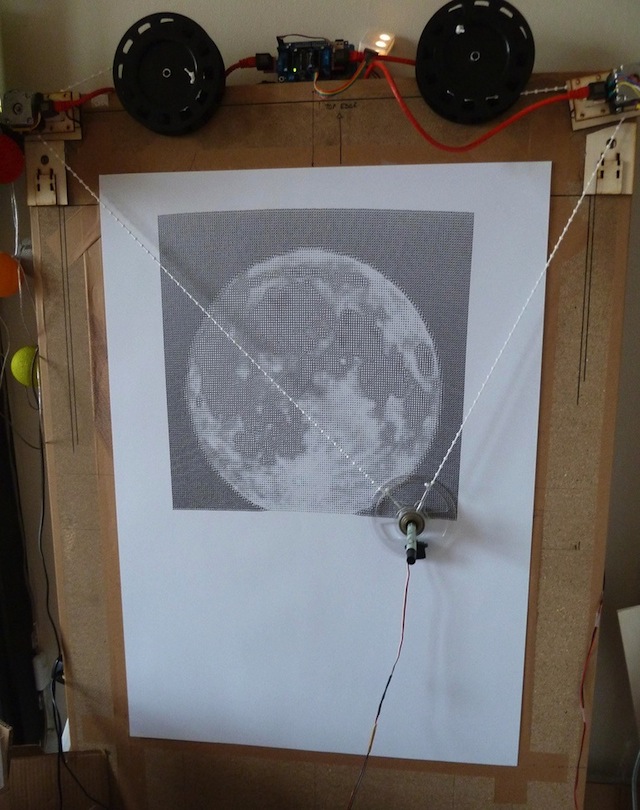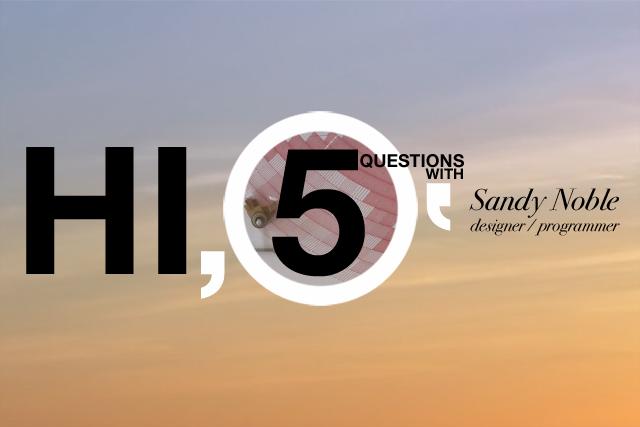About the Hi, 5 Interview Series
Hi, 5 (5 Questions) is a web-only interview series which presents five questions to artists, activists, and creative thinkers alike. The project acts as an educational device which allows us to gain insight into the narratives that define successful individuals. We are interested in the motivations behind ambitious ideas and how these individuals chart personal change in relation to their surroundings.
About Sandy Noble
Sandy Noble is a maker, a designer and a programmer. Sandy’s website is called Up To Much. Not home-spun exactly, but conceptually simple pieces, usually with some kind of particular conceit that makes them look more complex than they are, or complex, but with an elegant appearance: a series of elaborations on a basic concept.

Sandy Noble
February 22/2012
If you had to describe your current self to a 16-year-old you, what would you say?
Just like you, but all the the things that made you a bit odd then, are the things that make me valuable now.
Could you describe an evolution in your work or way of thinking?
I’m very attached to how things work, rather than what they look like, or probably even what they do. When I was a kid I made lots of plastic models, and enjoyed making some much more than others. Some kits assembled beautifully, with lots of sub-assemblies, tabs, interlocking pieces. Others left much more up to the builder’s skill to judge where a part should be stuck. I never painted them – that’s the boring bit – where’s the fun?
I’m still very technically-focused, and working on projects where I am the designer and also the implementer suits that focus, it’s absolutely appropriate. But it can be a handicap in the ideation phase of a project so I needed to learn to know when to switch it off. Learning about the stagey, iterative nature of the design process taught me when I should be thinking technically and when I should be thinking free-form.
I’m not very good at the free-form stuff, that’s the problem, and it’s partly a skills issue – I just never got very good at sketching fast, representation. Everything I do I tend to want to boil it down to a series of diagrams, and just hold the gestalt of it in my head. This skills problem really does flavour what I get around to doing – if it’s hard to express, it just doesn’t get done, or at least, it doesn’t get put down on paper. It just floats around in my head until it crystalizes enough to be diagrammed, and that’s unfortunately a good way to lose inspiration, and can be discouraging when I look in my sketchbook and see the same old thing page after page, rather than all the amazing ideas I think I’m having but can’t express very clearly.
Generally my work is very tools-led. I like using the tools much more than I like having the finished object. Design is nice because design itself is a great big tool that can be used to make anything. So I made a desk once, and it works great as a desk, but my favourite thing about it is the work I did designing it.
So my art is entirely a product of the machine – the machine is the real piece of work, the drawings that come from it are only the proofs. The polargraph machine is interesting too because it’s very very technical. It’s programmed with a certain behaviour, and that’s where I see the art in it, that’s where the magic is. Which is nice, because as a professional software developer, it’s the exact same art that I use during my day job.
Are there any people who have been instrumental in the development of your way of thinking and viewing the world?
Other than my immediate family, very few. My mom and dad are very practical people who would be happy to fix and make things from scratch. They tell me “I’ll show you how, then you can do it yourself” and in many cases this the result of being tired of endlessly doing stuff for other people, but in other cases it is a genuine wish to share something they find marvelous and engaging. Their house has a gate at the back with this carved wooden handle on the back, just a plain one, functional. And it’d been carved and polished up and sat there every day for forty years. I remember being amazed and proud when only fairly recently I realized my dad had made it from a block of wood rather than just buying one from a shop. It was clearly the product of some love, some enjoyment of the process. Because actually it was pretty unnecessary in that place. I was horrified when they threw that door away to get a new one, handle and all, all replaced by off-the-shelf hardware. They are very unsentimental like that.
I suppose I am too, which is why I don’t like things which are purely decorative. Even if a photograph or a painting looks beautiful, I’m more interested in knowing what technical aspects create that feeling, or how it was made than just letting it wash over me, and if I don’t know that, I can’t really decide if I like it or not.
How do your political beliefs inform or fuel your work as an artist?
I feel that if people take from others, they should give to others. And, paying forward rather than paying back. People would like me to claim that I invented the polargraph machine, or that I am a trail blazer of some sort for using 3d printing in jewellry, and are a little dismayed when I tell them these things are just the most recent development of very commonplace technology – there is no high-tech here, no genius, no special insight, only the will to experiment for it’s own sake, and the will to publicly invest in something. That in itself, like art, is quite attractive and will get people’s attention.
So even though I’m a little wary of just giving all my hard work away, I realize I must because I owe it. This is especially true in areas with a strong community, learning aspect, that is, open source software and hardware, and the people who made that possible. It feels very wrong to take something that is free, bottle it and try to sell it back.
What do you feel a city should be or do for its inhabitants?
A city should be present enough to lead people into a community, but get out of the way enough to allow people to shape it, splinter it, build individual identities within it. Easier said than done.

